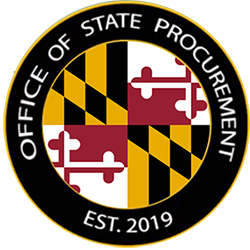The most recent changes to this page are highlighted in yellow (effective 10/1/25).
7.1 Final Approvals
7.2 Execution of the Contract
7.3 Publication on eMMA
7.1 Final Approvals
There may be several approvals that are required when the procurement officer is ready to move forward with a contract award, as well as approval from a procurement Control Agency and the BPW when the contract value exceeds a specified level. A final funding certification is also required.[66]
7.1.1 Agency Contract Approvals
- Small Procurements: Under State law, procurement units may award small procurements up to $100,000 without approval from a procurement Control Agency or the BPW.[67] However, the regulations governing small procurements require different contract award documentation depending on the value of the small procurement.[68] Procurement Officers are advised to use Exhibit 4. Small Procurement Sample Contract as appropriate.
- Emergency Contracts: An agency may award a contract or contract modification exceeding $50,000 without approval from a procurement Control Agency or the BPW on the basis of an emergency, in order to avoid or mitigate serious damage to public health, safety, and welfare as defined in regulation.[69] Emergency awards are required to be reported to the BPW within 45 days after contract award or modification.
7.1.2 Control Agency Approvals
Procurement Control Agencies are delegated specific levels of procurement and contracting authority by the BPW via regulations.[70] For procurement actions above the small procurement threshold and up to the BPW’s delegated levels of procurement and contracting authority, the Control Agency shall review and approve the agencies’ procurement action, and then submit to the BPW a monthly report summarizing those procurement actions. These reports are known as Procurement Agency Activity Reports (PAAR).[71]
7.1.3 BPW Approvals
All procurement actions that exceed the delegated procurement and contracting authority from the BPW must be submitted for approval on a BPW Action Agenda Item.[72] The BPW meets approximately every two weeks to review and approve these procurement action recommendations as well as other items under the BPW’s authority. Plan for BPW agenda submissions to the controlling agency at least two months prior to the anticipated contract notice to proceed.
Note that if an agency has a pending protest or appeal of a protest decision on a procurement contract award recommendation, and that agency wishes to move forward with approval of the contract in the face of protest or appeal, that agency must provide information related to the protest or appeal in the BPW Action Agenda Item. In addition, the agency must detail why execution of the contract without delay is necessary to protect substantial State interests.[73] The procuring agency shall notify the Maryland State Board of Contract Appeals (MSBCA) of its intent to award a contract pending protest or appeal.[74]
7.1.4 FMIS – ADPICS, R*STARS
Financial Management Information System (FMIS) is the official accounting system of record for the State comprised of accounting, purchasing and inventory, and reporting applications.
Relational Standard Accounting and Reporting System(R*STARS) is the State’s accounting system which controls the appropriations, disbursements and receipts of state funds. There are various accounting functions integrated into RSTARS: Budgeting, Fixed Asset Accounting, Cost Allocation, Document Tracking, General Ledger Accounting, Revenue Expenditure Accounting, Project and Grant Accounting, 1099 Processing, Federal and State Liability Offset, and Payment Processing.
Advanced Purchasing Inventory Control System (ADPICS) automates many of the activities related to procurement, receiving, payables, and inventory functions. ADPICS provides a comprehensive set of reports and online inquiries that are used to present procurement and inventory data maintained by the system. ADPICS reports include table listing and security reports as well as procurements, payables, and inventory reports.
Two auxiliary Reporting Systems exist in addition to the standard ADPICS and R*STARS reports. FOCUS/ADHOC is a reporting system that provides end-user access to R*STARS and ADPICS data from a single mainframe repository site. The intent is not to replace the existing FMIS standard reports, but rather enhance the end-user’s capabilities by adding another level of information retrieval to what is already a comprehensive assortment of standard reports. Currently, the FOCUS/ADHOC database contains a large subset of data from the two applications. Users can view data from R*STARS and ADPICS systems in one FOCUS session (depending on their security clearance).
7.2 Execution of the Contract
A procuring agency shall not sign (execute) a contract until all necessary approvals are received.
After all necessary approvals have been obtained, including sign-off as to legal form and sufficiency, agency head or designee approval, Control Agency and BPW approvals when necessary, and certification by the appropriate fiscal authority as to the availability of funds, the signed contract from the successful bidder or offeror is to be executed by the procuring agency with the appropriate department authority’s signature.[75]
The bidder or offeror is now the contractor. This final action constitutes contract award and may be accompanied by a Notice to Proceed (NTP) letter to the contractor. The contractor should also be sent an original fully executed contract.
Finally, the procurement file should be compiled with all required documentation, including an original fully executed contract.[76]
7.3 Publication on eMMA
After entering into a contract that exceeds the Category II small procurement amount in SFP §13-109 (currently set at $5,000+ to $50,000), the procurement agency shall publish notice of its award in eMMA within 30 days of contract execution and approval of the contract.[77]
[75] COMAR 21.05.03.03F. See also COMAR 21.03.03.01 re: Fund Certification; COMAR 21.03.02 re: Form and Legal Sufficiency
[77] COMAR 21.05.02.16, 21.05.03.03G, 21.05.04.04, 21.05.05.04A, 21.05.06.03E(1)

